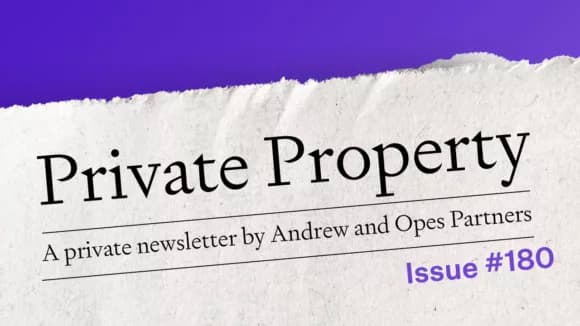
Property Investment
How to think like a millionaire (in just 90 seconds)
Do you think about your money in days, months, or decades? Here’s why the wealthy always think further ahead 👇
Property Investment
4 min read

Author: Andrew Nicol
Managing Director, 20+ Years' Experience Investing In Property, Author & Host
Reviewed by: Ed McKnight
Resident Economist, with a GradDipEcon and over five years at Opes Partners, is a trusted contributor to NZ Property Investor, Informed Investor, Stuff, Business Desk, and OneRoof.
Private Property – our weekly newsletter that gives you insights into what's happening in the NZ property market. Written by managing director Andrew Nicol. Sign up to receive this in your inbox every Thursday.
Prices hit record highs in November 2021.
Then the updated CCCFA lending law came in.
And snap. The straw broke the camel's back.
After crunching the data, there are the two main trends:
1) The South Island is holding up much better than the North Island.
Since November, houses in two-thirds of North Island council areas have fallen in value.
But in the South Island, it’s 50-50. Half have increased. Half have decreased.
2) The smaller regions are doing better than the major cities.
Houses in most cities (populations of 30,000 or more) have fallen in value. Some have increased. But most have gone down.
Those smaller council areas (where property prices tend to be cheaper) appear to be holding up better. See the maps below.
It’s time for the rumble of the regions. Let’s see which areas are rising and which are falling.
Taranaki, Northland and Otago have all done well. Houses have appreciated in these regions over the last 5 months.
Auckland, Wellington, Hawke’s Bay and Manawatu-Whanganui are all declining.
Auckland house prices, for instance, are down 7.8%.
That sounds like a lot. But there are a few factors you need to consider (I’ll point these out in a moment).
However, even within these regions, there is variation. This next map breaks down house price changes by council area.
See how most of the big house price falls (the dark red) are in the North Island.
Wairoa (in Hawke’s Bay) has fallen the most, along with Hamilton, Palmerston North, the Greater Wellington area, Auckland, Hauraki and Kawerau.
Down south, only Clutha district was among the top 10 biggest losers.
On the flip side, the biggest gainers (where prices increases) tend to be the smaller, lower population areas.
Buller, Opotiki and Waitaki all came out on top.
Given that about a third of Kiwis live in Auckland … the city deserves special mention.
When you look at the raw figures … Auckland appears to have done it rough. Property prices in the city dropped 7.8%.
That compares to a fall of only 1.8% for everywhere, excluding Auckland.
If you wanted to make the numbers look really dire, you could say prices there fell 4.3x faster than in the rest of the country.
But all is not quite as bad as it seems.
Because in the 5 months immediately before the November peak, Auckland house prices rocketed up 13.2% … which compares to (only) 9.7% for the rest of the country.
Because Auckland house prices shot up quickly before the peak, they have further to fall immediately after.
If you compare prices to just 10 months ago, Auckland is up 4.5%, and everywhere else is up 7.7%.
Overall, I expect the downturn in Auckland prices to mirror what happens in the rest of the country.
In the next few years, some regions will fare better than others.
To give you a sense of which is which … I’ve stolen another table from economist Tony Alexander.
Here, he’s categorised the areas that are most and least vulnerable to house price declines.
While Auckland has faced significant falls in the last few months. It only has average vulnerability.
Compare that to Whanganui, which has only fallen 3.5% so far … yet is considered more vulnerable to further declines.
What should you do with all this info?
One option is to say, “house values are falling; I’ll wait for the market to recover.”
An alternative is to take an opportunistic approach.
For instance, I’m out there hunting for deals right now … using the house price movements to my advantage.
How do you do this? Use the data to negotiate.
When I’m negotiating with a developer, I’m saying, “house values are down. You’re dreaming if you think an investor will pay that. The price needs to fit the market.”
And it looks like savvy investors agree.
A net 35% of real estate agents report investors out there looking to find a bargain, according to Tony Alexander and REINZ’s April real estate agent survey.
All this data isn’t just good to know because it’s interesting.
It could help you save tens of thousands of dollars in a negotiation.
Managing Director, 20+ Years' Experience Investing In Property, Author & Host
Andrew Nicol, Managing Director at Opes Partners, is a seasoned financial adviser and property investment expert with 20+ years of experience. With 40 investment properties, he hosts the Property Academy Podcast, co-authored 'Wealth Plan' with Ed Mcknight, and has helped 1,894 Kiwis achieve financial security through property investment.